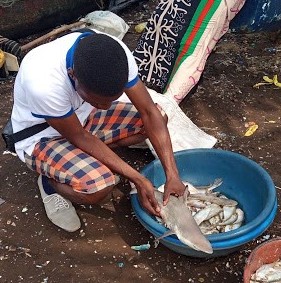For Black History Month, the British Ecological Society (BES) journals are celebrating the work of Black ecologists from around the world and sharing their stories. Lionel Yamb, who sits on the BES Equality and Diversity Working Group, shares his story below.

My name is Lionel Yamb; I’m an early career marine ecologist working in Cameroon with the Institute of Agricultural Research for Development (IRAD). I have a master’s degree in Marine Science from the University of Douala, Cameroon and my current work is focused on research, education and conservation of elasmobranch species including sharks and rays.
Marine conservation came in my life when I was still a BSc student, and I didn’t realise then that it would have such a profound impact. I started my career working as an intern with a local conservation NGO in Cameroon (African Marine Mammal Conservation Organization) and then after that, I started volunteering for a marine conservation programme, leading the sharks and rays monitoring at landing points and markets along the coast. This unique experience allowed me to understand the real threats to these species in the area; threats which are mainly linked to artisanal and semi-industrial fishing activities and the negative media reputation they have worldwide.

My current study aims to assess the local conservation status of elasmobranch species and develop a greater understanding of them in the local area. The overall goal is to provide decision-makers a baseline of shark and ray occurrence data in Cameroon waters to help improve wildlife laws that can ensure their long term conservation and management.
I was a great fan of the National Geographic shark documentaries when I was growing up and I became fascinated by these charismatic oceans predators from a young age. Today, these predators have now become prey; so I have decided to dedicate my career to protect them.
Being an ecologist in Cameroon
Being an ecologist in Cameroon is mostly about dealing with a lack of resources and skills available for research. Very few resources are allocated to ecology and species conservation because the field is still poorly understood, thus less considered and supported. Furthermore, the country doesn’t have enough money to invest in ecology as this is not really a priority; there are still many fundamental problems that need to be resolved including those relating to public health, education, food security and governance.
Therefore, most ecologists here are heavily dependent on international funding to conduct their research. This puts local ecologists in an uncomfortable position as resources allocated by international bodies are very competitive and therefore very uncertain.
Being black in the field of ecology
Being black in the field of ecology is something that I’m really enjoying so far; I have never really felt discriminated or unfairly treated because of the colour of my skin since I started working in ecology. However, at times, I feel misunderstood as many people don’t know enough about the needs of black ecologists, especially those who live and work in developing countries.
For example – the reasons why black ecologists from the developing world join professional societies are not always the same as the reasons for white ecologists from developed countries. Now and again, I feel like some professional societies in our discipline still struggle to understand that this can be an issue as these differences may create a feeling of not belonging.
Another common issue I’m used to seeing and would like to point out is that, white ecologists, especially those working in developing countries, sometimes create (intentionally or not) an environment in which their local black collaborators are made to feel less important.
Encouragingly however, I have seen many measures put in place by the scientific community during my career to support members of the black community and to fight against discrimination and inequality; there are more and more funding and training opportunities that are strictly reserved for under-represented ecologists, including black people, with the aim to put everyone on the same level when it comes to accessing funding for research as well as training and capacity building. I really appreciate these initiatives!
In addition, many ecological associations have developed strong Equality, Inclusion and Diversity programs to help black ecologists access key decision-making positions in ecology.
Hopes for the future
My dream is to see more and more black ecologists leading ecological research whose field work are located in their home country.
Most of the ecological research in Africa and on African systems and species are conducted by people from the UK, North America or Europe. These projects are often led by a Western ecologist, with local ecologists working as assistants or in supporting roles. This may be due to a “lack of skills”, but I believe that if researchers coming from these countries start investing in capacity building when working in Africa, they can help train the next generation of African leaders who can take charge of future ecological research on the continent.

A note to my younger self
I would tell my younger self not to underestimate what you can achieve as a black ecologist in the field. What I observe very often are young black people entering the field of ecology with an inferiority complex vis-à-vis their white collaborators. I would like to tell them and to my younger self that the field of ecology is made up of amazing people who may not have the same skin colour as you but are ready to help you achieve your goals – so don’t hesitate to talk to people and ask for help if needed.
Discover more blog posts like this on our Black History Month page on the British Ecological Society website. If you would like to contribute a post yourself, please get in touch.

Thanks for you leadership, we all need science leaders.
LikeLike